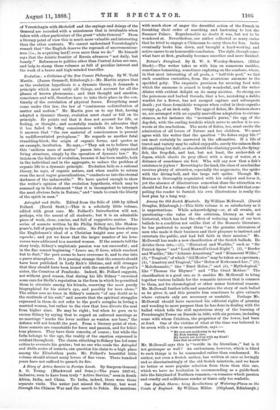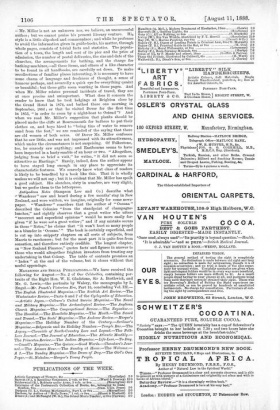— Mr. Miller is not an unknown nor, we believe,
an unsuccessful author; but we cannot praise his present literary venture. His
style is a little slip-shod and commonplace; and while he professes to avoid the information given in guide-books, his matter, through whole pages, consists of trivial facts and statistics. The popula- tion of a town, the length and cost of its pier and the price of admission, the number of postal deliveries, the size and date of the churches, the arrangements for bathing, and the charge for bathing-machines,—all these items, and others of a like character to be found in all handbooks, are carefully set down. To make recollections of familiar places interesting, it is necessary to have some charm of language and freshness of thought, a sense of humour perhaps, and assuredly a quick eye for everything quaint or beautiful ; but these gifts seem wanting in these pages. And when Mr. Miller relates personal incidents of travel, they are at once precise and unimportant. What does it concern the reader to know that he took lodgings at Brighton close by the Grand Hotel in 1874, and bathed there one morning in September, 1886 ; or that he visited Dover for the first time in 1855, " in order to cross by a night-boat to Ostend "? And
when we read Mr. Miller's suggestion that planks should be placed under the cliffs at Bournemouth for bathers to put their clothes on, and boys hired to "bring tins of water to remove sand from the feet," we are reminded of the saying that there are old women of both sexes. Of Dover Mr. Miller confesses that he saw little, and was not impressed with its attractiveness, which under the circumstances is not surprising. Of Folkestone, too, he scarcely saw anything; and Eastbourne seems to have been inspected in a hasty ramble of an hour or two. " Altogether, judging from so brief a visit," he writes, " it did not seem so attractive as Hastings." Rarely, indeed, does the author appear to have stayed long enough in any place to appreciate its characteristic features. We scarcely know what class of readers is likely to be benefited by a book like this. That it is wholly useless we will not say ; but it is evident that Mr. Miller has spoilt a good subject. His sketches, sixty in number, are very slight; but we prefer them to the letterpress.
Antipodean Notes (Sampson Low and Co.) describe what " Wanderer" saw and heard during a few months' stay in New Zealand, and were written, we imagine, originally for some news- paper. " Wanderer " considers that the author of " Oceana " described the Colonies "from the standpoint of champagne- lunches," and rightly observes that a great writer who utters "incorrect and superficial opinions" would be more easily for- given "if he were not a great writer ;" and if any mistake occurs in these "Notes," he claims that "it won't hurt so many people as a blunder in Oceans.' " The book is certainly superficial, and is cut up into snippety chapters on all sorts of subjects, from Maoris to racehorses ; but for the most part it is quite free from sensation, and therefore entirely credible. The longest chapter, on " New Zealand Finance," quotes facts' and figures in answer to those who would altogether frighten investors from trusting any undertaking in that Colony. The table of contents promises an " Index " at the end of the volume, but it closes without that useful appendage.



































 Previous page
Previous page